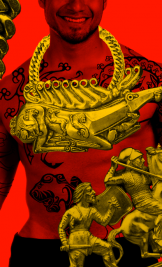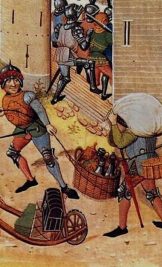

Radder than the Cold War: Intelligence and espionage in Ancient Rome
Roman military art is famous for its tactics, strategy, weaponry, and soldier training. However, it would not have been so successful without intelligence and espionage. There were special units in Ancient Rome that obtained information from the enemy, carried out political assassinations, and watched their own citizens to protect the rulers from attempted murders.
Undercover
Roman generals began to develop military intelligence after participating in the Punic Wars. Acumen and ingenuity of the Carthaginian military leader Hannibal contributed to this. He often sent spies to Roman camps, to infiltrate their troops and then escape to pass on the obtained information. According to some sources, Carthaginian agents had special gestures that allowed them to identify each other.
The Roman historian Titus Livius describes how the Romans cut off the hands of one such a spy to teach others a lesson. He does not tell the man’s name or rank, but recounts the bloody details of the case 200 years later: ‘About the same time a Carthaginian spy who for two years had escaped detection was caught in Rome, and after both his hands were cut off, he was sent away.’
The Romans suffered significant losses, until Publius Cornelius Scipio Africanus who developed his own methods of espionage began to command their units. For instance, he decided to send his centurions to the camp of the Numidian king Syphax, disguising them as slaves accompanying the delegation. However, the command was concerned that centurion Lucius Statorius might be recognized, as he had visited Siphax earlier with Roman emissaries. Therefore, it was decided to publicly punish him with sticks so that no one would doubt his low status. Lucius endured the beating for the sake of secrecy.
Undercover centurions located sentries and fortified areas to identify weak positions to attack the camp. Repeating the trick, groups of Scipio’s ‘slaves’ changed. This way, more and more information about the vulnerabilities of the Numidian camp was revealed.

Diplomats and spies
Expanding the territory under its control, Rome established more and more foreign relations. It was necessary to keep allies and dependent states under control and to keep an eye on enemies. This task was performed by ambassadors. They represented the government, reported the latest news, listened to the demands of the people, and most importantly, tried to maintain order on the ground. In order to do this, they had to obtain secret information on their own or with the help of their servants.
In her book Intelligence Activities in Ancient Rome, Rose Mary Sheldon of the Virginia Military Institute points out that the Greek historian Polybius calls Rome’s ambassadors kataskopoi, or spies. The plebeian tribune Tiberius Sempronius Gracchus fell under this definition when he was delegated to the East.
Appian, a Greek historian of the 1-2 century AD, recalled that the ambassadors sent to Antiochus IV to reconcile him with the Egyptian king Ptolemy V, actually tried to find out how the former felt about Roman power. Antiochus figured out their intentions, so the emissaries sent to the ‘center’ ruler’s complimentary reviews of the about Rome. However, Antiochus’ attitude toward Rome was much more complicated. When he was a child, he was taken prisoner by the Romans after the defeat of his father Antiochus III in the Battle of Magnesia. There was little reason for him to love Rome.
Gradually, the rulers of other states began to realize that Roman ambassadors were not just diplomats. Roman traders also came under suspicion. In order to avoid trouble at the beginning of the war with Rome, Mithridates VI, killed almost all the Romans in his land. In his book The Lord of Pontus, historian Yevgeniy Molev states that the hunt for the Romans began after a failed plot:
‘Having uncovered one of the plots against him among his entourage and executing the conspirators, Mithridates sent his men everywhere to track down enemies hidden and apparent, and encouraged those who denounced the king’s enemies in every way possible. Based on these denunciations, 80 people were captured and executed in Pergamon alone. In total, 1,600 people died as a result of denunciations.’

At the same time, there was no official intelligence agency in Rome for a long time, as members of the Senate worried that it would be used to spy on politicians in the city itself. The fears were partly justified. After all, the Senate consisted of wealthy aristocrats who didn’t mind increasing their wealth and fulfilling their political ambitions.
Historian Velleius Paterculus points out in his Roman History that the architect of the plebeian tribune Marcus Livius Drusus suggested the customer to design the building ‘so that it would be invisible and unreachable for eyewitnesses’, that is, most likely, to protect it from eavesdropping and surveillance.
Besides, there could not be centralized intelligence services, as wealthy Roman nobles had their own personal informants and spies. Gaius Sallustius noted in his Conspiracy of Catiline that Cicero suppressed the rebellion with the help of bodyguards and his own spy network: ‘Matters having proceeded thus far, and a night being appointed for the departure of the deputies, Cicero, being by them made acquainted with every thing, directed the praetors, Lucius Valerius Flaccus, and Caius Pomtinus, to arrest the retinue of the Allobroges, by laying in wait for them on the Milvian Bridge; he gave them a full explanation of the object with which they were sent, and left them to manage the rest as occasion might require.’
Caesar was the most famous assertor of private espionage. During the Roman civil war, everyone publicly rejoiced in the dictator’s victories and mourned his defeats, because they knew they could have been eavesdropped somewhere around the corner.
It’s worth mentioning Caesar’s military couriers, speculatores, who delivered intelligence and performed espionage missions. They used special ciphers to convey secret messages. In fact, this is how the Caesar cipher or the shift cipher appeared, when a letter is replaced by either the previous or the next in the alphabetical hierarchy. The Italian mafia will use a similar principle in their secret messages.
Postmen and couriers
The Roman emperor Octavian Augustus learned from Caesar for a reason. During his reign, the postal and courier service, cursus publicus, was created. This service not only conveyed information but also verified it and, if necessary, reported it to the top.
An important task of the cursus publicus was to determine safe passages for the emperor, which became ‘routes’ of national importance. Of course, the service could not guarantee absolute security, as it could also be infiltrated by a spy. Roman politicians continued to use secret couriers and correspondence.
There was a bad habit to hand letters to servants to read. Once, Emperor Caracalla received a strange letter. Someone reported that the praetorian prefect Marcus Opellius Macrinus was plotting against the head of state. Instead of reading the message himself, the emperor passed it on to the same Macrinus. Caracalla was assassinated on April 8, 217, on his way from Edessa to Carrhae, not aware of the danger. Macrinus became his successor.

Later, all the functions of cursus publicus were transferred to speculatores, the army intelligence. The main task of the intelligencers was not only to deliver messages and spy, but also to convoy criminals, detain political opponents of the government, or execute convicts. The Gospel of Mark mentions that a speculator was sent to the prison to kill John the Baptist: ‘And immediately the king sent an executioner (σπεκουλάτωρ), and commanded his head to be brought; and he went and beheaded him in the prison.’

Frumentarii, Ancient Rome security service
Under the Emperor Domitian, the numerus frumentariorum were created. Initially, frumentarii was the name of soldiers who bought grain from the inhabitants of the provinces where the army was stationed. Intendants knew the roads, local customs, languages, and generally had useful information. Gradually, it became clear that those are the best spies to be found. Their base was located on the Caelian Hill in Rome. The service permanently consisted of less than 100 people only.
Frumentarii were commanded by princeps castrorum peregrinorum, whose rank corresponded to the senior centurion of the legion. Service in the numerus frumentariorum could help a capable person make an impressing career. For example, Marcus Oclatinius Adventus began his service as a regular soldier, later was transferred to a scouting unit, became a member of frumentarii, then a unit commander, and after years of excellent service, a procurator of Britain. In 212, Emperor Caracalla appointed him prefect of the Praetorian Guard and his closest aide. Adventus could have become the next emperor, but he refused to fight for the throne. He lived a long life though.
Speculatores and frumentarii remained independent services, but often cooperated, being in the same units at the level of local chancelleries. The functions of the frumentarii remained unchanged: deliver of correspondence, intelligence, denunciations, convoy of the criminals, and executions. At the same time, they kept an eye on the civilian population and persecuted the undesirables. They also bought bread for the army. In the early 1st century AD, under Emperor Hadrian, political paranoia raised to unprecedented proportions. Frumentarii could detained and imprison someone on the mere suspicion that a person wanted to oppose the ruler. Christians also suffered from them.

What happened next:
- Roman emperors often used frumentarii as assassins. Septimius Severus once attempted to assassinate the emperor’s governor in Britain, Clodius Albinus, using his own frumentarii. The latter was accused of separatism and excessive hunger for power. However, Clodius managed to protect himself with guards and thwart Severus’ plan.
- The frumentarii often exceeded their authority and used the power for personal gain, engaging in banal robbery of respected citizens of Rome. Emperor
Diocletianreformed numerus frumentariorum into agentes in rebus around 319 AD. They recruited not only soldiers but also civilians. Agents performed the same functions, delivering government correspondence, controlling roads and inns, spying, and arresting officials. - Agentes in rebus survived the Roman Empire and continued to exist in Byzantium. The last mention of such a secret service dates back to 678. The agent was part of a diplomatic delegation to the ruler of the Umayyad Caliphate, Mu’awiya ibn Abi Sufyan.










